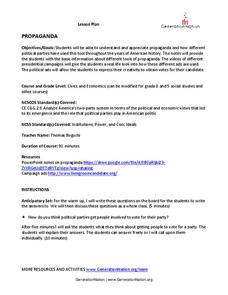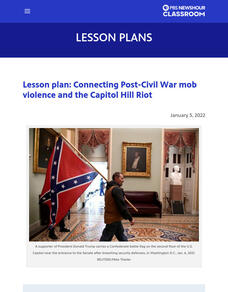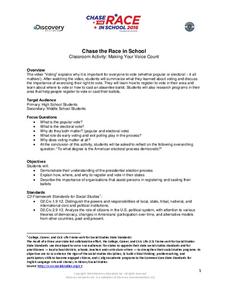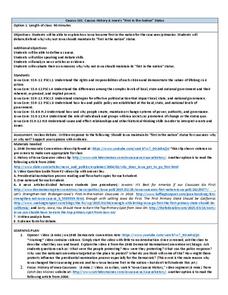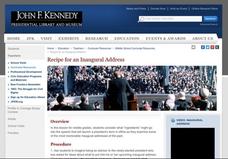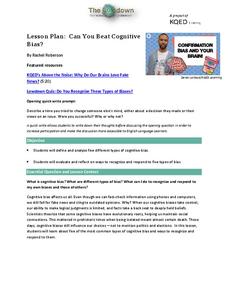Encyclopedia Britannica
Beyond a Two-Party System
Young political scientists go beyond the two-party system and research third-party candidates running in the 2020 US Presidential election. Groups present background information about the candidate, the party's platform points, and a...
Curated OER
Presidential Election Year: Major Issues
Whether or not it's a presidential election year, this debate activity will spark research on current political issues. Split your government scholars into 4 groups and assign each a political party. One person will be the "candidate"...
Constitutional Rights Foundation
The Election of 1912
The Election of 1912: an election with four competitive opponents. Pupils get to know the candidates with informative reading passages that provide context to the election. Then, the class engages in a debate and answers questions as one...
Curated OER
Presidential Elections: A Simulation
Feeling ambitious about getting your scholars examining the election process? While this presidential election simulation will take preparation, the ensuing enthusiasm will be worth it! Using one or more large classes, 12th graders are...
Carolina K-12
Are You a Democrat or a Republican? Are You Really?
Have new or soon-to-be voters examine different political parties and their platforms as they figure out which one aligns most with their beliefs. After taking a few online quizzes, students split into pairs to discuss and then in larger...
City University of New York
Electoral College
A presidential election is a lot like the 2004 World Series, and it's also a lot like choosing an orange in a paper bag. Apply the process of the electoral college to these two analogies with a set of lessons about government...
C-SPAN
The Electoral College and the Constitution
What is the purpose of the Electoral College? Is it antiquated, or does it have a place in today's political climate? High schoolers view a series of video clips as they analyze the parts of the United States Constitution that address...
Generation Nation
Propaganda
How does propaganda influence our vote? Through grand conversation, scholars gain information about what is and how to identify the different ways propaganda is used in a presidential election. Using their new-found knowledge, citizens...
Curated OER
Homemade Political Parties
Use this 5-day lesson to clarify the platforms of the two major parties, comparing and contrasting against students' beliefs. Begin by looking at unlabeled summaries of both party platforms, having learners identify most with one. Groups...
Facing History and Ourselves
Laws and the National Community
When it comes to the law, is justice always served? Teach scholars about how law sometimes enables prejudice of entire groups of people with a unit on World War II that includes a warm-up activity, analysis of primary sources,...
Institute of Electrical and Electronics Engineers
Cast Your Vote
In a simple but unique instructional activity, youngsters learn about the history of voting systems. They then collaborate in groups to develop a new honest and consistent voting method. A class-wide poll is taken, evaluating the designs...
School Improvement in Maryland
Evaluating Political Advertisements
How do interest groups try to influence elections? As part of their study of the election process, groups view 30-second advertisements produced by advocacy groups and use the provided worksheet to evaluate these ads. They then craft...
Maryland Department of Education
The Concept of Identity Lesson 8: Propaganda in Visual Media
Visual and print propaganda are featured in a lesson that asks readers of A Separate Peace to examine the techniques used in propaganda from World War I, World War II, presidential elections, and in the novel.
PBS
Connecting Post-Civil War Mob Violence and the Capitol Hill Riot
Anti-democratic violence is not new in the United States. Learners watch videos and then compare and contrast the 1873 Colfax and the 1898 Wilmington massacres. They then watch a video about the Capitol Hill insurrection of 2021 and...
Discovery Education
Making Your Voice Count
As learners watch a video on voting, they take notes on a worksheet that lists various voting topics, including electoral and popular votes, early voting, and exit polling. Then, young people research the Internet for their state's...
Caucus 101
Caucus History and Iowa’s “First in the Nation” Status
What is a caucus? Why is Iowa's first? Why did Iowa shift to the caucus format? After researching these basic questions, class members debate the question of whether or not Iowa should maintain its "first in the nation" status for caucuses.
Curated OER
Validating Votes
Explore the discrepancies in Florida's vote counting process in 2000 and 2002 with this New York Times reading lesson. Middle schoolers study the viewpoints presented in informational text, paying attention to how word choice can...
John F. Kennedy Presidential Library & Museum
Recipe for an Inaugural Address
An inaugural address represents the first moments of a new beginning. Using John F. Kennedy's speech as a model for guided practice, groups examine the ingredients of an inaugural address. Individuals then repeat the analysis process...
NPR
Can You Beat Cognitive Bias?
In a time of fake news, media manipulation, and Internet trolls, a resource equips learners with the tools they need to recognize and combat resources that are designed to appeal to our cognitive biases. Introduce learners to five...
Foreign Policy Research Institute
Understanding China: The Prospects for Democracy in China
This document provides useful information for a unit on democracy in China. While it does not include detailed activities, it does have a list of democratic principles, and important facts about China that facilitate understanding of its...









